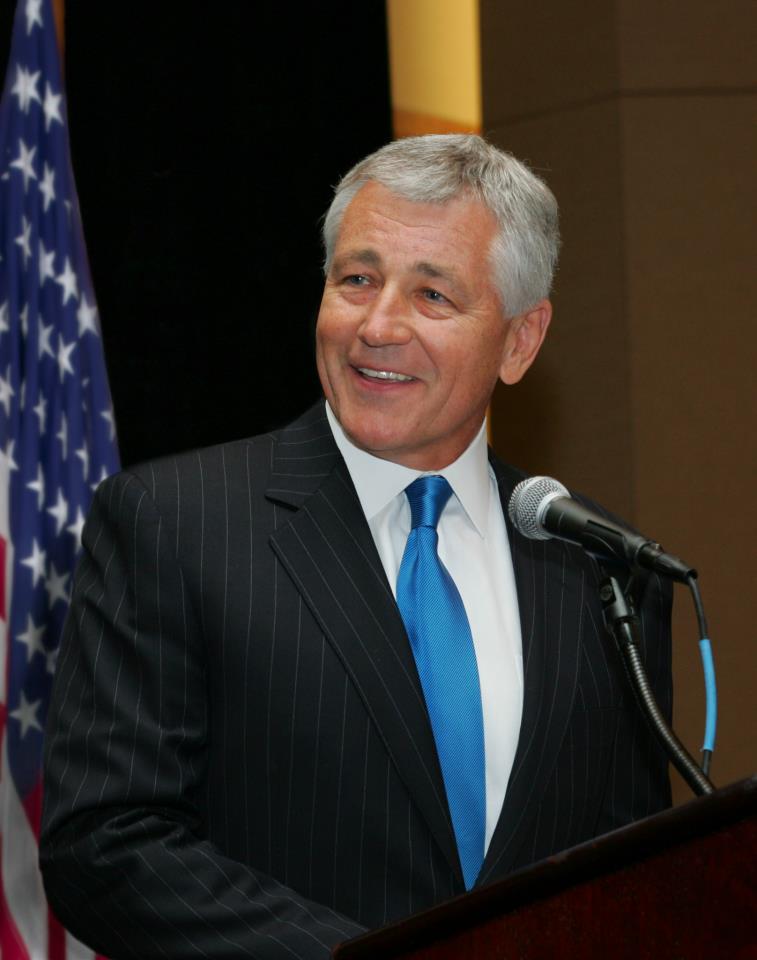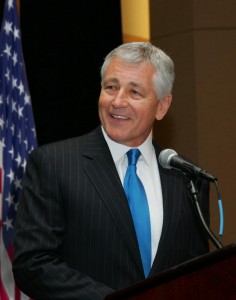
ASP Board Member Chuck Hagel’s Position on Nuclear Issues
By Terri S. Lodge and Mary Kaszynski
There has been much discussion of Senator Chuck Hagel’s positions on nuclear issues, particularly Iran and U.S. nuclear reductions. Contrary to what some have claimed, Sen. Hagel’s views are well within the mainstream of national security experts. In fact, Sen. Hagel is one of a growing consensus of senior military leaders and policymakers for strategic, nonpartisan solutions to today’s nuclear challenges.
1. Senator Hagel has a well-informed view and a pragmatic approach to the Iran nuclear challenge.
Sen. Hagel does not underestimate the national security risk posed by Iran. “Our differences with Iran are real,” he said at a 2007 event at the Center for Strategic and International Studies, adding “Iran is a state sponsor of terrorism and continues to provide material support to Hezbollah and Hamas.”
Sen. Hagel also understands the importance of preventing an Iranian nuclear weapon. In a recent Washington Post op-ed he wrote, “War with Iran is not inevitable, but U.S. national security would be seriously threatened by a nuclear-armed Iran.”
That same op-ed, authored with Adm. William Fallon, Lee Hamilton, Amb. Thomas Pickering and Gen. Anthony Zinni, outlines a pragmatic approach to Iran stance on U.S. policy towards Iran:
“Our position is fully consistent with the policy of presidents for more than a decade of keeping all options on the table, including the use of military force, thereby increasing pressure on Iran while working toward a political solution.”
Sen. Hagel’s approach to Iran is clearly the most in line with U.S. security interests. There is still time to resolve the nuclear issue through diplomacy; we must make every effort achieve a negotiated solution. However, the military option must remain on the table.
2. Senator Hagel, with many senior security experts on both sides of the aisle, supports a U.S. nuclear strategy for the 21st century.
Sen. Hagel was a member of the commission chaired by General James Cartwright, who oversaw U.S. nuclear forces as commander of U.S. Strategic Command. Amb. Thomas Pickering, and Gen. Jack Sheehan were also members.
The Cartwright Commission noted the U.S. nuclear strategy is out of step with today’s security environment. As Gen. Cartwright explained in an interview,
“The world has changed, but the current arsenal carries the baggage of the cold war. There is the baggage of significant numbers in reserve. There is the baggage of a nuclear stockpile beyond our needs.”
Sen. Hagel and the other members of the Cartwright Commission called for updating U.S. nuclear strategy by eliminating excess nuclear weapons and delivery systems and investing in capabilities that effectively address 21st century security challenges.
The Commission proposed a force of 900 nuclear weapons (450 deployed, 450 in reserve) as an illustration of the nuclear strategy that might result from a reassessment of the current security environment.
The Cartwright proposal was an example of what updated nuclear force might look like, not the only possibility. Many other proposals have made similar recommendations. The Cartwright option is lower than current levels, but it is similar to other proposals for rightsizing the nuclear force.
Those who still support a Cold-War sized nuclear arsenal are in the minority. The majority of security experts, like Sen. Hagel and the Cartwright Commission, agree that updating the U.S. nuclear arsenal for the 21st century will strengthen national security
3. While in office, Senator Hagel worked to promote nuclear security issues.
Sen. Hagel cosponsored legislation to strengthen the Nonproliferation Treaty, which is fundamental to U.S. nonproliferation efforts, and the International Atomic Energy Agency, which monitors nuclear facilities and materials worldwide.
The bill made several other vital contributions to nuclear security. It facilitated removing nuclear material from dangerous places – something everyone can applaud. It called for reductions in Russia’s arsenal of nonstrategic nuclear weapons (also urged in the New START resolution of ratification) and supported the nuclear reduction treaty with Russia (New START itself). And the bill called for maintaining the nuclear test moratorium and exploring ways to ratify the Comprehensive Test Ban Treaty, but only on a bipartisan basis.
Sen. Hagel’s leadership on nuclear security issues shows his dedication to promoting U.S. national security interests.







[…] Read more at ASP Board Member Chuck Hagel’s Positions on Nuclear Issues […]